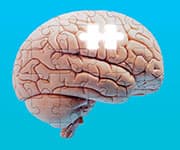Life Extension Magazine®
Nearly 50% of adults aged 65 and older suffer from early-stage memory deficits, mild cognitive impairment, or worse.1
Over 30% of those suffering from early cognitive decline will progress to full-blown dementia within just five years.2
But there’s good news: Two nutrients have been shown in clinical studies to help protect cognitive function, stop memory loss and even possibly reverse early symptoms of cognitive decline.3-6
In one study following patients over four years, a trend was observed in which low-dose lithium lowered the risk of mild cognitive impairment progressing to dementia by nearly half, compared to those who took a placebo.3
In another, 54% of patients with early-stage Alzheimer’s who took a proline-rich peptide complex had improvements in their cognitive scores over the course of a year, while those taking a placebo deteriorated.5
A Progressive Condition
The risk for cognitive decline increases with age. It is also progressive, meaning it grows over time with symptoms that include confusion and memory loss.
Only about 3% of people aged 65 to 74 have a diagnosis of full-blown dementia. But that number jumps to nearly 30% in those 85 and older.7
No approved drugs have been shown to significantly improve brain function once a diagnosis of dementia is made.
But scientists have found that some nutrients may slow the progression of the disease, and possibly halt or reverse its progression.3-6,8,9
Two of these nutrients, lithium and a proline-rich polypeptide complex, work by targeting the changes that occur in the brain with aging.
Brain Changes and Dementia
The brain undergoes structural changes as normal aging progresses.
These changes cause death and dysfunction of brain cells, shrinking the volume of the brain. This damage is associated with the memory deficits seen with mild cognitive impairment and dementia.
One of the most notable structural changes in the aging brain is the buildup of toxic protein clumps.
In youth, cells have means of clearing abnormal or damaged proteins. With older age, these cleaning mechanisms become less efficient, and the protein deposits build up.
Over time, these toxic proteins damage the brain and kill brain cells. They have generally been thought to interfere with brain function and healthy cognition.
A key player in brain aging is an enzyme known as glycogen synthase kinase 3 (GSK-3).
Ordinarily, this enzyme plays a role in the management of glucose metabolism. But in older age it can become overactive.10
Excess GSK-3 activity is a significant contributor to the formation of toxic protein clumps.11,12
Much research has been dedicated to finding ways to prevent the buildup of toxic proteins and to normalize GSK-3 activity. Two nutrients have been identified that do just that.
Lithium Protects the Brain
Very high doses of lithium have long been used to treat the psychiatric condition bipolar disorder.
But research shows that lithium in low doses is important for overall health and cognition.6
One of the ways lithium can work to preserve mental function and prevent cognitive decline is by improving the brain’s ability to clear amyloid proteins. In a mouse model of Alzheimer’s, lithium treatment increased brain clearance of amyloid by 31% while reversing long-term memory deficits.13
Other studies show that low-dose lithium reduces toxic protein clumps in the brain as well.14
Additional animal and cell studies have shown that lithium also protects the brain by helping to improve cellular "housekeeping," mitochondrial function, production of brain growth factors, and more.15
Human Trials of Lithium
Lithium may help slow the worsening of cognitive decline.
In one clinical study, a micro-dose of just 300 mcg of lithium daily was found to significantly decrease cognitive decline in Alzheimer’s patients, compared to a placebo.6
Another study evaluated low-dose lithium in older adults with mild cognitive impairment and memory loss.3 These patients are at high risk of progressing to worse cognitive function and, eventually, dementia.
Subjects were randomized to receive either lithium or a placebo for two years. The placebo group showed significant functional and cognitive decline on dementia scales over the study period.
The lithium group, on the other hand, remained stable, with better performance on memory and attention tasks.
Researchers continued to follow these patients for a total of four years and compared them to those who took a placebo. They observed a trend in which low-dose lithium lowered the risk of mild cognitive impairment progressing to dementia by nearly half.
What you need to know
Help Prevent Brain Aging
- Memory loss and cognitive decline are extremely common in older age. They often progress to full-blown dementia.
- Small doses of the mineral lithium inhibit the enzyme GSK-3, associated with risk for cognitive dysfunction and the progression of structural damage to the brain.
- A proline-rich polypeptide complex derived from milk has been shown in preclinical studies to reduce amyloid and tau protein deposition in the brain, as well as the resulting loss of brain cells.
- Clinical studies show that untreated individuals with mild cognitive impairment or Alzheimer’s disease tend to worsen significantly over time. But those given lithium or a proline-rich polypeptide complex remain stable or even experience improvement in cognitive function.
Looking for further evidence of brain protection with lithium,16 researchers reviewed randomized controlled trials, prospective observational studies, and meta-analyses published in the medical literature.
They found level 1 evidence—the highest level of scientific evidence—that lithium use is associated with greater beneficial brain gray matter volume.
In cognitive decline, the volume of gray matter (where brain cells reside) typically shrinks over time due to cell death. Lithium appears to preserve brain volume in multiple brain regions, including the hippocampus, which is critical for the formation of new memories.
Proline-Rich Polypeptides Fight Brain Aging
Colostrum is the early milk that mothers produce after a baby is born. Peptides (protein fragments) isolated from mother’s milk contain large amounts of the amino acid proline.
This proline-rich polypeptide complex has been found to help aging brains resist those harmful structural changes.
Intake of this polypeptide complex alters expression of genes associated with the production of amyloid and the abnormal modification of tau proteins that lead to neurofibrillary tangles.17
In laboratory studies, this polypeptide complex mimics the effects of nerve growth factors by causing changes in some cells, including helping immature cells mature into functional cells. This increases the growth of nerve fibers.18,19
In a mouse model of accelerated aging, use of the proline-rich polypeptide complex improved learning and memory and extended average lifespan by 26%.20
Human Studies of Proline-Rich Polypeptides
In a randomized controlled trial, subjects with early-stage Alzheimer’s disease received either the proline-rich polypeptide complex or a placebo.5 Cognitive impairment was evaluated by scores on the Mini-Mental State Examination.21
After one year, those in the placebo group had a significant reduction in Mini-Mental State Examination scores.
But an astonishing 54% of those taking the polypeptides had improvements in their cognitive scores. The remainder were stable, without any worsening of cognitive function.
Those who had milder symptoms at the start of the study showed the greatest improvement on average, suggesting that starting to take the complex early is most beneficial.
The same group of researchers performed another study that followed subjects for a longer period, some for as long as 28 months.4 At every time interval tested, cognitive function scores continued to improve for those in the proline-rich polypeptide group.
Patients with an Alzheimer’s diagnosis typically deteriorate over any period of observation. To see an improvement in cognitive function is a remarkable achievement.
The proline-rich polypeptide complex and lithium work in very different ways to preserve cognitive function. Taking these nutrients in combination may maximize their ability to help protect the brain.
Summary
Memory loss and cognitive decline are common with advancing age. Many people with mild cognitive dysfunction eventually progress to Alzheimer’s disease or other forms of dementia.
Currently available medications do little to slow the progression of cognitive dysfunction. However, low doses of the trace mineral lithium and a milk-derived proline-rich polypeptide complex show great promise in clinical trials.
Both have shown that they help block the progression of the amyloid and tau protein structural damage that occurs in aging brains.
In human studies, the nutrients stabilize or even reverse signs of cognitive dysfunction, while those taking a placebo tend to deteriorate over time.
Many readers of this magazine take low-dose (1,000 mcg) lithium daily for potential longevity benefits, as well as neurological protection.
Those who want to take a combination of 300 mcg of lithium plus proline-rich polypeptide can safely continue supplementing with 1,000 mcg of lithium.
If you have any questions on the scientific content of this article, please call a Life Extension Wellness Specialist at 1-866-864-3027.
References
- Aigbogun MS, Stellhorn R, Krasa H, et al. Severity of memory impairment in the elderly: Association with health care resource use and functional limitations in the United States. Alzheimers Dement (Amst). 2017;8:51-9.
- Ward A, Tardiff S, Dye C, et al. Rate of conversion from prodromal Alzheimer’s disease to Alzheimer’s dementia: a systematic review of the literature. Dement Geriatr Cogn Dis Extra. 2013;3(1):320-32.
- Forlenza OV, Radanovic M, Talib LL, et al. Clinical and biological effects of long-term lithium treatment in older adults with amnestic mild cognitive impairment: randomised clinical trial. Br J Psychiatry. 2019 Nov;215(5):668-74.
- Leszek J, Inglot AD, Janusz M, et al. Colostrinin proline-rich polypeptide complex from ovine colostrum--a long-term study of its efficacy in Alzheimer’s disease. Med Sci Monit. 2002 Oct;8(10):PI93-6.
- Leszek J, Inglot AD, Janusz M, et al. Colostrinin: a proline-rich polypeptide (PRP) complex isolated from ovine colostrum for treatment of Alzheimer’s disease. A double-blind, placebo-controlled study. Arch Immunol Ther Exp (Warsz). 1999;47(6):377-85.
- Nunes MA, Viel TA, Buck HS. Microdose lithium treatment stabilized cognitive impairment in patients with Alzheimer’s disease. Curr Alzheimer Res. 2013 Jan;10(1):104-7.
- Langa KM, Larson EB, Crimmins EM, et al. A Comparison of the Prevalence of Dementia in the United States in 2000 and 2012. JAMA Intern Med. 2017 Jan 1;177(1):51-8.
- Casey DA, Antimisiaris D, O’Brien J. Drugs for Alzheimer’s disease: are they effective? P T. 2010 Apr;35(4):208-11.
- Yiannopoulou KG, Papageorgiou SG. Current and future treatments for Alzheimer’s disease. Ther Adv Neurol Disord. 2013 Jan;6(1): 19-33.
- Lauretti E, Dincer O, Pratico D. Glycogen synthase kinase-3 signaling in Alzheimer’s disease. Biochim Biophys Acta Mol Cell Res. 2020 May;1867(5):118664.
- Hanger DP, Hughes K, Woodgett JR, et al. Glycogen synthase kinase-3 induces Alzheimer’s disease-like phosphorylation of tau: generation of paired helical filament epitopes and neuronal localisation of the kinase. Neurosci Lett. 1992 Nov 23;147(1):58-62.
- Noble W, Planel E, Zehr C, et al. Inhibition of glycogen synthase kinase-3 by lithium correlates with reduced tauopathy and degeneration in vivo. Proc Natl Acad Sci U S A. 2005 May 10;102(19):6990-5.
- Pan Y, Short JL, Newman SA, et al. Cognitive benefits of lithium chloride in APP/PS1 mice are associated with enhanced brain clearance of beta-amyloid. Brain Behav Immun. 2018 May;70:36-47.
- Liu M, Qian T, Zhou W, et al. Beneficial effects of low-dose lithium on cognitive ability and pathological alteration of Alzheimer’s disease transgenic mice model. Neuroreport. 2020 Sep 9;31(13):9 43-51.
- Forlenza OV, de Paula VJ, Machado-Vieira R, et al. Does lithium prevent Alzheimer’s disease? Drugs Aging. 2012 May 1;29(5):335-42.
- Hajek T, Weiner MW. Neuroprotective Effects of Lithium in Human Brain? Food for Thought. Curr Alzheimer Res. 2016;13(8):862-72.
- Szaniszlo P, German P, Hajas G, et al. New insights into clinical trial for Colostrinin in Alzheimer’s disease. J Nutr Health Aging. 2009 Mar;13(3):235-41.
- Boldogh I, Kruzel ML. Colostrinin: an oxidative stress modulator for prevention and treatment of age-related disorders. J Alzheimers Dis. 2008 Apr;13(3):303-21.
- Janusz M, Zablocka A. Colostrinin: a proline-rich polypeptide complex of potential therapeutic interest. Cell Mol Biol (Noisy-le-grand). 2013 Nov 3;59(1):4-11.
- Boldogh I, Aguilera L, German P, et al. Colostrinin increases the life-span and neurological performance in senescence accelerated mice. Neurodegenerative Dis. 2007;4:264.
- Pangman VC, Sloan J, Guse L. An examination of psychometric properties of the mini-mental state examination and the standardized mini-mental state examination: implications for clinical practice. Appl Nurs Res. 2000 Nov;13(4):209-13.







